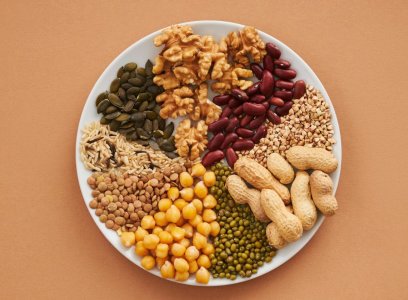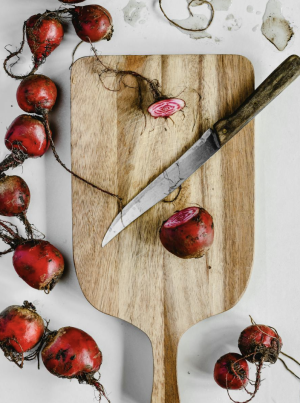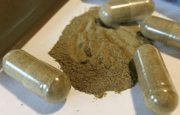Three simple foods that support heart health—without breaking your grocery budget
By
Veronica E.
- Replies 0
As we age, caring for our hearts becomes more important than ever.
Heart disease remains the leading cause of death in the US and across the world, yet some of the most effective steps toward prevention start right in the kitchen.
You don’t need an expensive meal plan or specialty products to make a difference—just a few key ingredients and some small, consistent changes.
Experts agree that circulation plays a central role in cardiovascular health, supporting everything from blood pressure to clot prevention.
But with so many different diets and health claims out there, it’s easy to feel overwhelmed.
That’s why cardiologists are sharing their top food picks to help you cut through the noise.
These affordable grocery staples may already be on your shopping list—and if they’re not, they’re easy to add.

Beans are often overlooked, but they’re packed with benefits.
Dr. Cheng-Han Chen, an interventional cardiologist, calls them a “well-rounded food source”—and with good reason.
Beans are rich in fiber, magnesium, and plant-based protein, all of which help lower LDL (bad) cholesterol and improve how your blood vessels function.
According to Dr. Ragavendra Baliga from The Ohio State University Wexner Medical Center, beans also have a low glycemic load, making them a smart choice for people managing blood sugar levels.

Their potassium and magnesium content further supports healthy blood pressure.
Beans are one of the most cost-effective proteins out there, and their versatility makes them easy to enjoy in soups, stews, salads, or even dips.
Dietary guidelines suggest aiming for at least 2.5 cups of beans and lentils each week.
Beets may not be everyone’s favorite vegetable, but their circulation-boosting properties are hard to ignore.
Dr. James D. Mills from Rutgers Robert Wood Johnson Medical School explains that beets are high in nitrates, which your body converts to nitric oxide—a compound that helps relax and widen blood vessels.

In addition to improving blood flow, beets provide antioxidants and anti-inflammatory compounds that support overall heart health.
They’re delicious roasted, added to salads, or blended into smoothies for a vibrant, earthy twist.
If the taste of beets isn’t quite to your liking, try pairing them with citrus or goat cheese to balance out their flavor.
Berries might be small, but their impact on heart health is mighty.
Dr. Catherine Weinberg notes that berries are full of polyphenols—plant compounds that reduce inflammation, which is a major contributor to heart disease.
Like beets, berries also support nitric oxide production, helping your blood vessels function more effectively.
Whether you prefer them fresh, frozen, or dried, berries are an easy and delicious addition to your meals.
Try them in yogurt, oatmeal, smoothies, or simply as a snack.

While these three foods are a great place to start, cardiologists also emphasize the importance of a whole-food, anti-inflammatory approach to eating.
Dr. Weinberg recommends the Mediterranean diet, which includes:
It’s also a good idea to cut back on ultra-processed foods, which tend to be high in salt, sugar, and unhealthy fats.
Dr. Chen encourages limiting these items whenever possible to reduce strain on the heart.
Dr. Baliga adds that consistency is key. A healthy meal every now and then isn’t enough—it’s the long-term habits that make the biggest difference.

If changing your eating habits sounds overwhelming, try easing in with smart substitutions.
Dr. Weinberg suggests replacing processed or sugary items with more nutritious alternatives. A few examples:
These kinds of swaps are simple but effective—and you’re more likely to stick with them in the long run.
Eating for heart health doesn’t have to mean expensive groceries or complicated recipes.
With simple additions like beans, beets, and berries, you can nourish your body, support circulation, and enjoy meals that are both satisfying and affordable.
As cardiologists remind us, small, consistent choices can make a big difference over time.
Read next: Is your go-to way to relax actually putting your heart at risk? Here’s what cardiologists say

Have you added more beans, beets, or berries to your meals? Are there other budget-friendly foods that you’ve found helpful for circulation or blood pressure?
We’d love to hear your go-to tips and recipes. Feel free to share in the comments!
Heart disease remains the leading cause of death in the US and across the world, yet some of the most effective steps toward prevention start right in the kitchen.
You don’t need an expensive meal plan or specialty products to make a difference—just a few key ingredients and some small, consistent changes.
Experts agree that circulation plays a central role in cardiovascular health, supporting everything from blood pressure to clot prevention.
But with so many different diets and health claims out there, it’s easy to feel overwhelmed.
That’s why cardiologists are sharing their top food picks to help you cut through the noise.
These affordable grocery staples may already be on your shopping list—and if they’re not, they’re easy to add.

Simple, everyday foods like beans, beets, and berries can make a big difference in supporting long-term heart health. Image Source: Pexels / Photo By: Kaboompics.com.
Beans: Affordable, filling, and heart-friendly
Beans are often overlooked, but they’re packed with benefits.
Dr. Cheng-Han Chen, an interventional cardiologist, calls them a “well-rounded food source”—and with good reason.
Beans are rich in fiber, magnesium, and plant-based protein, all of which help lower LDL (bad) cholesterol and improve how your blood vessels function.
According to Dr. Ragavendra Baliga from The Ohio State University Wexner Medical Center, beans also have a low glycemic load, making them a smart choice for people managing blood sugar levels.

Humble and hearty, beans are an affordable staple packed with heart-healthy fiber and nutrients. Image Source: Pexels / Vanessa Loring.
Their potassium and magnesium content further supports healthy blood pressure.
Beans are one of the most cost-effective proteins out there, and their versatility makes them easy to enjoy in soups, stews, salads, or even dips.
Dietary guidelines suggest aiming for at least 2.5 cups of beans and lentils each week.
Also read: Heart attack deaths are down—but these conditions are now claiming more lives
Beets: A natural way to boost blood flow
Beets may not be everyone’s favorite vegetable, but their circulation-boosting properties are hard to ignore.
Dr. James D. Mills from Rutgers Robert Wood Johnson Medical School explains that beets are high in nitrates, which your body converts to nitric oxide—a compound that helps relax and widen blood vessels.

Beets are rich in natural nitrates that help boost circulation and support overall heart health. Image source: Pexels / Eva Bronzini.
In addition to improving blood flow, beets provide antioxidants and anti-inflammatory compounds that support overall heart health.
They’re delicious roasted, added to salads, or blended into smoothies for a vibrant, earthy twist.
If the taste of beets isn’t quite to your liking, try pairing them with citrus or goat cheese to balance out their flavor.
Also read: The simple tweak that could make your workouts even better for your heart
Berries: Tiny fruits with big benefits
Berries might be small, but their impact on heart health is mighty.
Dr. Catherine Weinberg notes that berries are full of polyphenols—plant compounds that reduce inflammation, which is a major contributor to heart disease.
Like beets, berries also support nitric oxide production, helping your blood vessels function more effectively.
Whether you prefer them fresh, frozen, or dried, berries are an easy and delicious addition to your meals.
Try them in yogurt, oatmeal, smoothies, or simply as a snack.

Berries are loaded with antioxidants and polyphenols that help reduce inflammation and protect the heart. Image source: Pexels / Susanne Jutzeler, suju-foto.
Also read: This one lifestyle change could reduce heart attack risk by 50%, researchers say
More ways to care for your heart
While these three foods are a great place to start, cardiologists also emphasize the importance of a whole-food, anti-inflammatory approach to eating.
Dr. Weinberg recommends the Mediterranean diet, which includes:
- Fatty fish like salmon and sardines for omega-3s
- Colorful vegetables rich in vitamins and minerals
- Olive oil as the main cooking fat
- Nuts and seeds for heart-healthy fats
- Fermented foods like yogurt and kimchi to support gut health
It’s also a good idea to cut back on ultra-processed foods, which tend to be high in salt, sugar, and unhealthy fats.
Dr. Chen encourages limiting these items whenever possible to reduce strain on the heart.
Dr. Baliga adds that consistency is key. A healthy meal every now and then isn’t enough—it’s the long-term habits that make the biggest difference.

A heart-healthy favorite, salmon is packed with omega-3 fatty acids that support circulation and reduce inflammation. Image source: Pexels / Valeria Boltneva.
Also read: Are you skipping this daily habit? Scientists say it could put your heart at risk
Start with small swaps
If changing your eating habits sounds overwhelming, try easing in with smart substitutions.
Dr. Weinberg suggests replacing processed or sugary items with more nutritious alternatives. A few examples:
- Use brown rice or quinoa instead of white rice
- Snack on fruit or nuts instead of candy
- Cook with olive oil instead of butter
These kinds of swaps are simple but effective—and you’re more likely to stick with them in the long run.
Eating for heart health doesn’t have to mean expensive groceries or complicated recipes.
With simple additions like beans, beets, and berries, you can nourish your body, support circulation, and enjoy meals that are both satisfying and affordable.
As cardiologists remind us, small, consistent choices can make a big difference over time.
Read next: Is your go-to way to relax actually putting your heart at risk? Here’s what cardiologists say
Key Takeaways
- Cardiologists recommend adding beans, beets, and berries to your diet, as these budget-friendly foods can help improve circulation and support cardiovascular health.
- Beans are high in fiber, magnesium, and plant-based protein, which can help lower bad cholesterol, regulate blood pressure, and improve blood vessel function.
- Beets and berries both help the body produce nitric oxide, which relaxes and widens blood vessels, improving circulation—they also provide antioxidants and reduce inflammation.
- Experts suggest emphasizing whole, minimally processed foods like vegetables, nuts, seeds, fatty fish, and fermented foods, while limiting ultra-processed foods, added sugars, and sodium for overall heart health.
Have you added more beans, beets, or berries to your meals? Are there other budget-friendly foods that you’ve found helpful for circulation or blood pressure?
We’d love to hear your go-to tips and recipes. Feel free to share in the comments!






